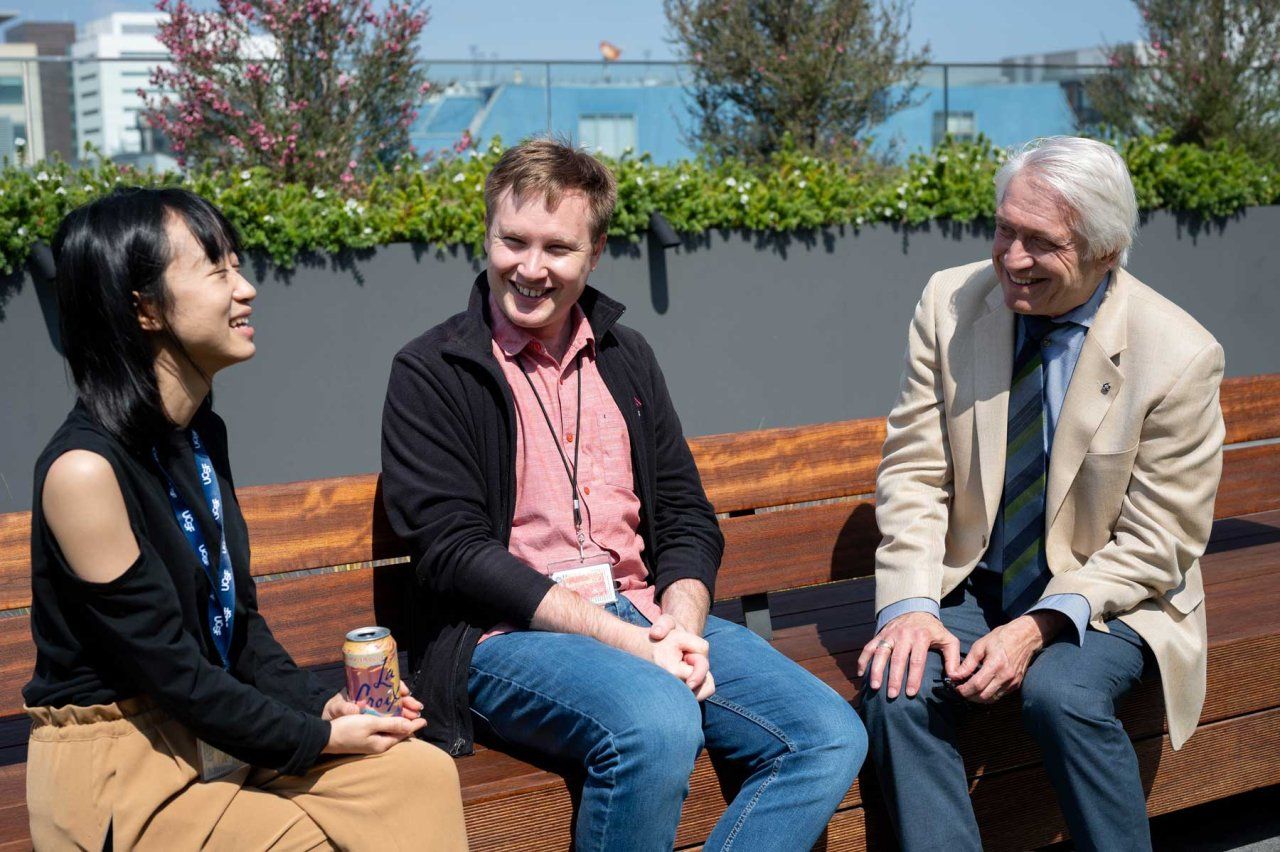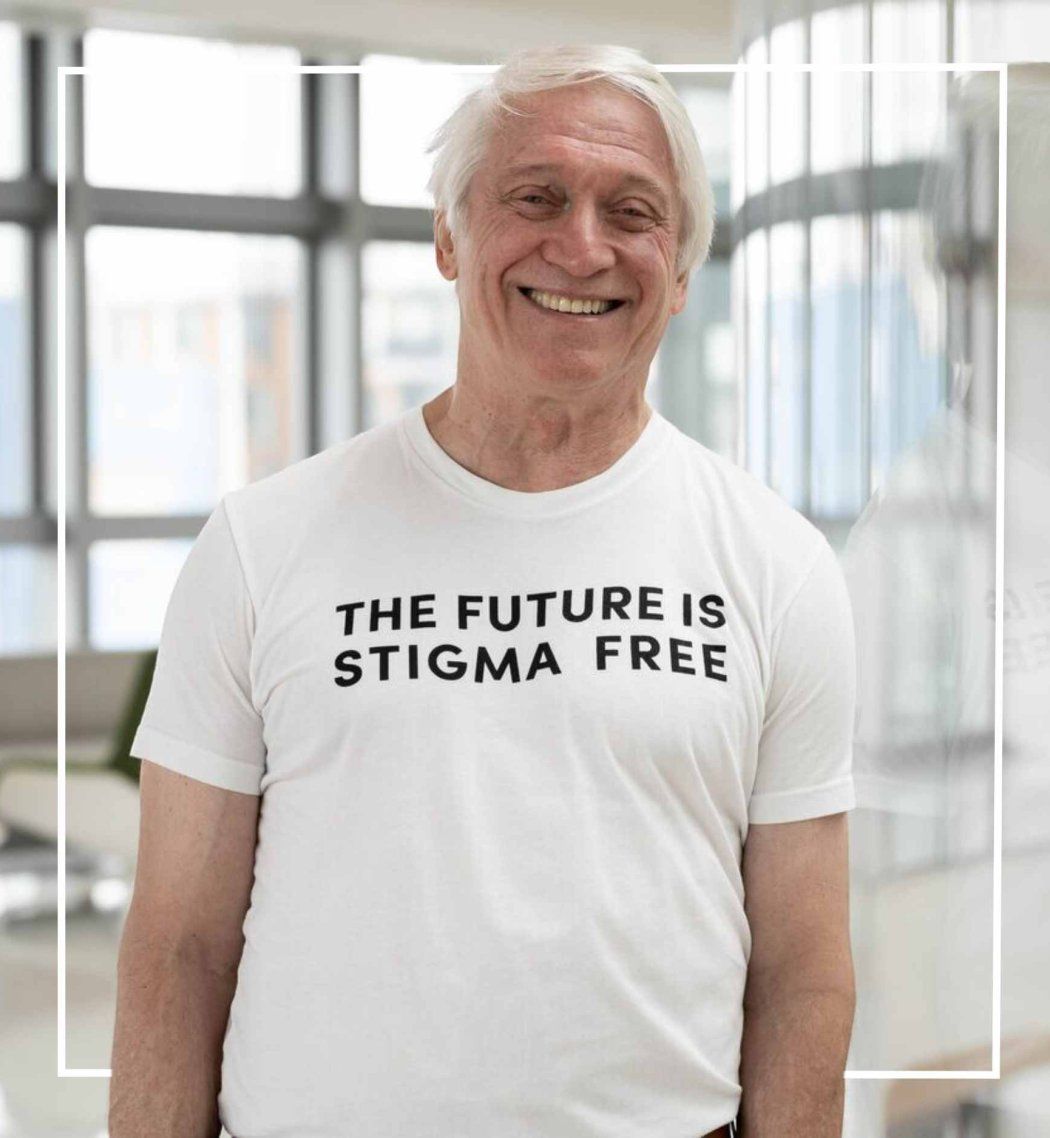This story is part of a series to raise the visibility of people living with a disability at UCSF and to share resources available at UCSF to serve and support this community. Join us as we share their stories.
For Stephen Hinshaw, PhD, mental health is personal.
The Columbus, Ohio native got used to his dad not being around for long periods of time when he was growing up. No one talked about it. At times, he didn’t know whether his dad was alive or not.
But that wasn’t always the case.
When he was visiting home during his freshman year at Harvard University, his dad, prominent philosopher Virgil Hinshaw, Jr., pulled him aside for the first of many disclosures. Hinshaw learned that his dad had been diagnosed with schizophrenia for decades, ever since a misguided attempt to save the world from the oncoming Nazi threat by jumping from the roof of his family home with the delusion that he could fly. He had been “treated” in some of the nation’s worst facilities and his life had been a series of cycles of grandiosity, despair and high achievement.
I got interested in psychology, mental health, research, teaching, and advocacy largely based on those family experiences.”
Virgil’s main doctor had forbidden Hinshaw’s parents from ever mentioning mental illness to Steve and his younger sister, warning they’d “be permanently destroyed.” Such practices were common in those days. Tragically, Hinshaw learned to internalize the shame, blaming himself for things over which he had no control. “The idea was that psychotic forms of mental disorder were so potentially lethal, frightening, and threatening, it was best to pretend they didn’t happen. We know that to be completely wrong now,” Hinshaw said.
Later, Hinshaw understood that his father had actually been experiencing severe bipolar disorder for 40 years. He finally helped secure an accurate diagnosis and treatment.
A personal and professional journey
Not only was his dad’s revelation an eye-opening personal experience, but it was also transformative for Hinshaw as a student. Up to that point, Hinshaw had been thinking of a career in medicine or science, but he “didn’t really know how to approach mental health issues.” After learning of his dad’s condition, Hinshaw changed his major to psychology. He graduated from Harvard in 1974, earning his PhD degree in Clinical Psychology from UCLA and eventually working as a postdoctoral fellow at UCSF.

Following stints as a visiting lecturer at UC Berkeley, assistant professor at UCLA, and an assistant and associate professor at UC Berkeley, Hinshaw now serves as distinguished professor of psychology at UC Berkeley and professor of psychiatry and behavioral sciences at UCSF.
His research, which focuses on externalizing behavior dimensions and disorders (especially ADHD), including family, peer, and neuropsychological risk factors, clinical trials, and the stigmatization of mental illness, has led to coverage in mainstream media outlets all over the world – plus countless honors from his peers and academic societies. Over the last decade, Hinshaw has been documented as one of the 10 most productive scholars in the field of clinical psychology. Now 70, Hinshaw has that moment at home to look back on as a catalyst.
Keeping watch on himself
It was his own personal mental health journey that Hinshaw knew could be looming once he began to understand the genesis of his dad’s struggles. “Bipolar disorder is highly heritable. I knew enough back then to think ‘Maybe I’m next,” he said. “I was terrified I would go the same way dad did…but also inspired to learn more.”
That he did, while also keeping a keen eye on his own, evolving symptoms.
“It was a gradual realization in my 20s and 30s that I was on the mood-disorder spectrum,” Hinshaw recalled. He realized that his bursts of energy and tendencies toward despair when things went wrong did not place him in the same category of “Bipolar 1” illness his dad had experienced. The legacy of family risk for mental disorder turned out to be part of who he was. That also led to a kind of survivor’s guilt, given Hinshaw’s overall drive and general stability.
“Sometimes it’s hard to let go,” he added.
Yet he kept his family issues – and his own – silent for a number of years, fearing he would never become a psychologist or professor if the truth were known.
His story becomes his work
In his research on attention-deficit/hyperactivity disorder (ADHD), mood disorders, and stigma reduction, Hinshaw has worked with kids all the way through adulthood – making him “a lifespan psychologist,” he said. “You see all sorts of battles. You see the battle of shame and stigma, and the lack of access to evidence-based treatment.”
He’s fought similar battles himself. “One of the things we’re told in Western societies is to tough it out, that it’s a sign of weakness to admit you’re down or not fully thriving. But instead, it’s a sign of strength. We all need life skills. We have check-ups for our cars, so why not for our minds? We all need support. We all need to be understood.”
For Hinshaw, that starts with his own story, one that he often cites in classes, speeches, and lectures to connect with the audience. It’s proven to be an effective strategy in humanizing the topic. “You can see the nods when the slides of family members and personal struggle come out,” he said.
All of this came to fruition with the publication of Hinshaw’s memoir, “Another Kind of Madness: A Journey Through the Stigma and Hope of Mental Illness,” in 2017.
That doesn’t mean, however, Hinshaw is completely open about his and his family’s mental health struggles 24/7. “I don’t go around the Berkeley and San Francisco campuses wearing a sandwich board saying I’ve had depression or that dad nearly succumbed to bipolar disorder,” Hinshaw said. “Disclosure is best done with timing, rehearsal, and support. What we cannot have is what I grew up with, where families are forbidden from talking about mental illness or even acknowledging it. Everybody gains when you diagnose and treat mental illness.”
How do you reduce stigma? It’s not as easy as it might seem, Hinshaw said.
Hinshaw’s world is different from the one he grew up in, or the one his dad experienced in the 1920s and 1930s. He often thinks about the world his three sons will continue to grow up in. “They’re not ashamed of their grandfather. Instead, they’re proud of him.”
Diversity is inclusion.
Join the conversation at UCSF.
Accommodations for All
Everyone should be able to fulfill their potential. Support, assistance, and reasonable accommodations are available for all UCSF faculty, learners, and staff with disabilities or medical conditions.
Become an ally and advocate
UCSF provides training and webinars for all staff to learn more about disability awareness and reasonable accommodations.
